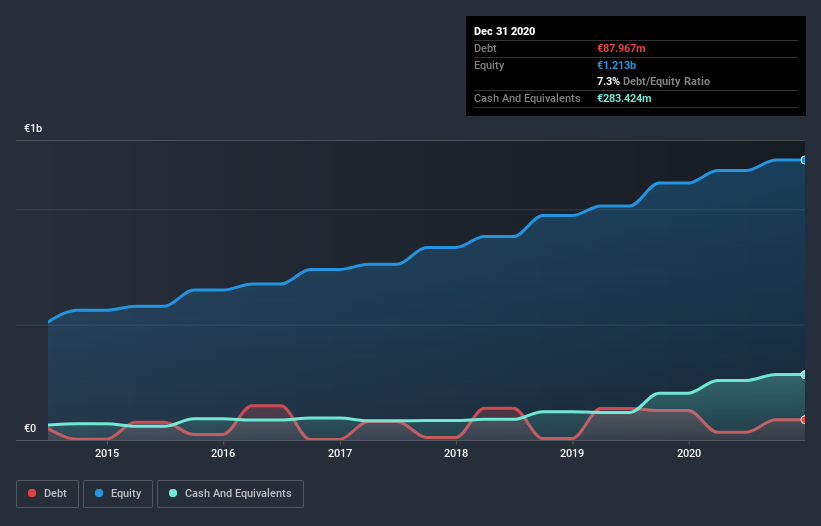
The external fund manager backed by Berkshire Hathaway's Charlie Munger, Li Lu, makes no bones about it when he says 'The biggest investment risk is not the volatility of prices, but whether you will suffer a permanent loss of capital.' When we think about how risky a company is, we always like to look at its use of debt, since debt overload can lead to ruin. As with many other companies Alten S.A. (EPA:ATE) makes use of debt. But the real question is whether this debt is making the company risky.
Why Does Debt Bring Risk?
Debt assists a business until the business has trouble paying it off, either with new capital or with free cash flow. Ultimately, if the company can't fulfill its legal obligations to repay debt, shareholders could walk away with nothing. While that is not too common, we often do see indebted companies permanently diluting shareholders because lenders force them to raise capital at a distressed price. Of course, plenty of companies use debt to fund growth, without any negative consequences. The first step when considering a company's debt levels is to consider its cash and debt together.
Check out our latest analysis for Alten
How Much Debt Does Alten Carry?
The image below, which you can click on for greater detail, shows that Alten had debt of €88.0m at the end of December 2020, a reduction from €127.7m over a year. But it also has €283.4m in cash to offset that, meaning it has €195.5m net cash.

A Look At Alten's Liabilities
The latest balance sheet data shows that Alten had liabilities of €708.0m due within a year, and liabilities of €231.5m falling due after that. Offsetting these obligations, it had cash of €283.4m as well as receivables valued at €774.2m due within 12 months. So it actually has €118.1m more liquid assets than total liabilities.
This short term liquidity is a sign that Alten could probably pay off its debt with ease, as its balance sheet is far from stretched. Simply put, the fact that Alten has more cash than debt is arguably a good indication that it can manage its debt safely.
It is just as well that Alten's load is not too heavy, because its EBIT was down 47% over the last year. Falling earnings (if the trend continues) could eventually make even modest debt quite risky. There's no doubt that we learn most about debt from the balance sheet. But it is future earnings, more than anything, that will determine Alten's ability to maintain a healthy balance sheet going forward. So if you're focused on the future you can check out this free report showing analyst profit forecasts.
But our final consideration is also important, because a company cannot pay debt with paper profits; it needs cold hard cash. While Alten has net cash on its balance sheet, it's still worth taking a look at its ability to convert earnings before interest and tax (EBIT) to free cash flow, to help us understand how quickly it is building (or eroding) that cash balance. During the last three years, Alten generated free cash flow amounting to a very robust 97% of its EBIT, more than we'd expect. That puts it in a very strong position to pay down debt.
Summing up
While it is always sensible to investigate a company's debt, in this case Alten has €195.5m in net cash and a decent-looking balance sheet. And it impressed us with free cash flow of €297m, being 97% of its EBIT. So we don't have any problem with Alten's use of debt. When analysing debt levels, the balance sheet is the obvious place to start. But ultimately, every company can contain risks that exist outside of the balance sheet. For example - Alten has 1 warning sign we think you should be aware of.
If you're interested in investing in businesses that can grow profits without the burden of debt, then check out this free list of growing businesses that have net cash on the balance sheet.
If you’re looking to trade Alten, open an account with the lowest-cost* platform trusted by professionals, Interactive Brokers. Their clients from over 200 countries and territories trade stocks, options, futures, forex, bonds and funds worldwide from a single integrated account. Promoted
New: Manage All Your Stock Portfolios in One Place
We've created the ultimate portfolio companion for stock investors, and it's free.
• Connect an unlimited number of Portfolios and see your total in one currency
• Be alerted to new Warning Signs or Risks via email or mobile
• Track the Fair Value of your stocks
This article by Simply Wall St is general in nature. It does not constitute a recommendation to buy or sell any stock, and does not take account of your objectives, or your financial situation. We aim to bring you long-term focused analysis driven by fundamental data. Note that our analysis may not factor in the latest price-sensitive company announcements or qualitative material. Simply Wall St has no position in any stocks mentioned.
*Interactive Brokers Rated Lowest Cost Broker by StockBrokers.com Annual Online Review 2020
Have feedback on this article? Concerned about the content? Get in touch with us directly. Alternatively, email editorial-team (at) simplywallst.com.
About ENXTPA:ATE
Alten
Operates as an engineering and technology consultancy company in France, North America, Germany, Scandinavia, Benelux, Iberian, Spain, Italy, the United Kingdom, the Asia-Pacific, Switzerland, Eastern Europe, and internationally.
Very undervalued with flawless balance sheet.


